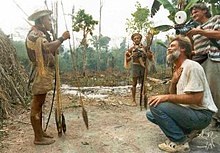|
|
| |
|
|
| |
|
|
|
|
| |
 |
| An anthropologist
with indigenous American people. |
Anthropology
Anthropology is the study of human beings. (In Greek "Anthropos-"
means "human", and "-logy" means "study of".)
Anthropology is a biological and historical social
science that helps us learn how groups of people are the
same, and how they are different in all parts of the
world. Anthropologists do research in many places and
study how people live now and how they may have lived in
the past (using the study of Archaeology). They research
in modern cities, small villages, tribes, and in the
countryside. They study how groups of people consider
time, space, life, etc.
Applied anthropology is a type of anthropology that uses
information, discovered using science to help people.
One recent use of applied anthropology is the return of
ancient ways of successful farming to people living in
South America. Another use of applied anthropology is
the learning of languages close to dying out and the
teaching of young people the language of their
ancestors. |
|
Archaeology
Archaeology, which studies human activity through
investigation of physical evidence, is considered a branch
of anthropology in the United States and Canada, while in
Europe it is viewed as a discipline in its own right or
grouped under other related disciplines, such as history. A
key distinguishing factor between archeology and
anthropology is the focus on analyzing material remains in
archaeology. |
|
History
The abstract noun anthropology is first attested in
reference to history. Its present use first appeared in
Renaissance Germany in the works of Magnus Hundt and
Otto Casmann. Their New Latin anthropologia derived from
the combining forms of the Greek words ánthrōpos
(ἄνθρωπος, "human") and lógos (λόγος, "study"). (Its
adjectival form appeared in the works of Aristotle.) It
began to be used in English, possibly via French
Anthropologie, by the early 18th century. |
|
Fields
The four main fields of anthropology are: |
- Archaeology - The study of how
people lived in the past. Archaeologists learn from
things people leave behind, like pottery, stone tools,
or anything made or used by humans.
- Physical anthropology - The study of
human biology, including how people adapt to where they
live and how bodies changed over time (evolution).
Physical anthropologists also study non-human primates.
- Linguistic anthropology - The study
of how people speak and the words they use and how their
language developed (evolved). Linguistic anthropology
also studies how language changes what people think and
how people change language.
- Cultural anthropology - The study of
how people live their lives now and how they may have
lived in the past, including the tools they used and the
food they obtained and ate. It is also related to
sociology and social psychology.
Most people who study anthropology have some schoolwork
in all four big kinds of anthropology but later study
one or two areas primarily.
|
|
|
|
|
|
|
|
|
|
|
|
|
|
|
|
|
|
|
Search Fun Easy English |
|
|
|
|
|
|
|
|
|
|
|
|
|
|
|
About
Contact
Copyright
Resources
Site Map |